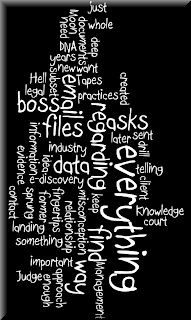 Reading Patrick Lambe’s Green Chameleon post entitled “Memory and Infantilism” reminded me of a saying I heard in law school about identifying what is, and what is not important. Lambe discusses the total screw-up that NASA did with the Lunar tapes, and the UK police did in losing important files related to a horrific child-rape case. Although there is a lot of facts surrounding both of those examples, it really, really boils down to the fact that we believe we can basically capture and maintain everything that we think is relevant to what we may want on down the road.
Reading Patrick Lambe’s Green Chameleon post entitled “Memory and Infantilism” reminded me of a saying I heard in law school about identifying what is, and what is not important. Lambe discusses the total screw-up that NASA did with the Lunar tapes, and the UK police did in losing important files related to a horrific child-rape case. Although there is a lot of facts surrounding both of those examples, it really, really boils down to the fact that we believe we can basically capture and maintain everything that we think is relevant to what we may want on down the road.
In a way, we do this with our Knowledge Management approach to everything from email to client files to court documents to contact relationship data. There is a whole subset of the legal industry (e-discovery) that has sprung from the idea of “everything is there, we just need to drill deep enough into the data to find it.” These practices have created a misconception that if we keep everything, the “important” information will be there when we want to find it. Tapes regarding the Moon landing will be there 40 years later… files regarding DNA evidence will be there when the Judge asks for them… that email that your former boss sent you telling you to do something will be at your fingertips when your new boss asks “why the Hell did you do it that way?”
This all reminds me of a saying that someone told me back in law school. “If you highlight the entire casebook, you’ve learned absolutely nothing.”
In other words, you should only highlight (store and archive) those things that you think you’ll have to recall later on the final exam. The same concept could be adapted to how we treat the KM life cycle of information that flows through our possession today. Regardless if it is email, client files, or court documents there needs to be a realistic approach to how we handle that information. The most obvious would be any legal obligation we have to maintain and archive the information. There are certain things we should legally and/or ethically keep for a specific period of time. But, most of the data that we handle does not fall under these requirements. In fact, I’d wager that 90% of the emails, electronic documents, or paper documents we keep, we do because we are implementing the “CYA” rule.
The problem comes down to an issue of “mass”. It is very easy to file things away on backup tapes, or ship hard drives and paper documents off site for a hundred years. In some cases it is actually cheaper to keep files in off site storage for a few decades, than it is to pay the cost of having the items destroyed. The combination of “CYA” + ease of storage + idea of easy recall creates a situation where we’ve highlighted everything, and cannot recall the important items later. The result is like a 2nd year law student that has highlighted his entire Federal Civil Procedure book… When asked to recall specific information, we find that we either cannot recall the information (tapes got erased, DNA evidence got misplaced, etc.) or, we cannot isolate what is important versus what is irrelevant (the old back the dump truck up and give them everything we know approach.)
Knowledge Management should not be based on a “cast a wide net” approach to the information that flows in and out of our firms. In fact, most information should be ephemeral in nature; addressing only the specific need of the moment and not be thought of as a permanent addition to the knowledge of the firm. When we try to capture everything, we end up capturing nothing. In the end we end up losing the important pieces of knowledge because they are buried in a mountain of useless data filed under the topic of “CYA”.